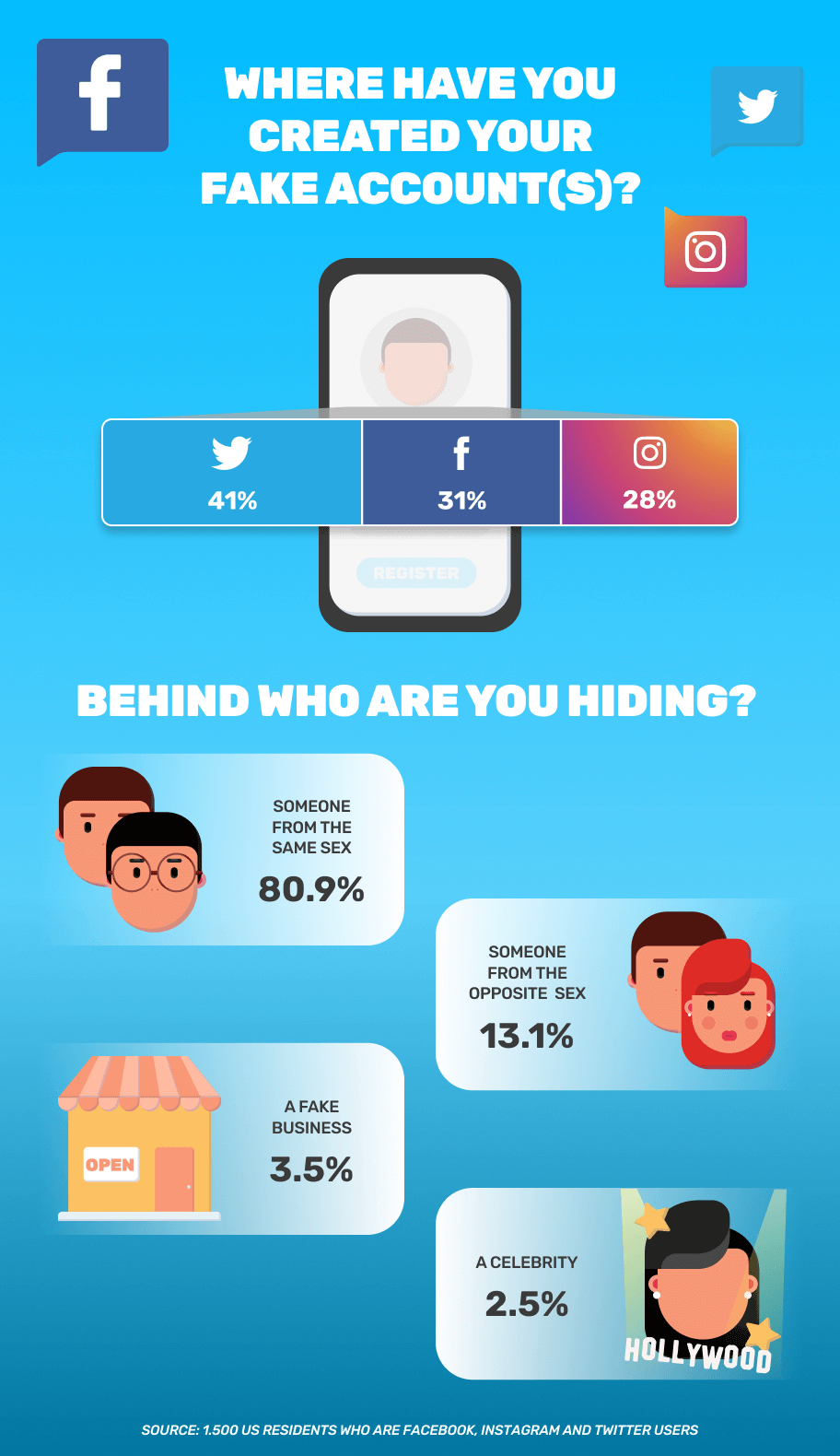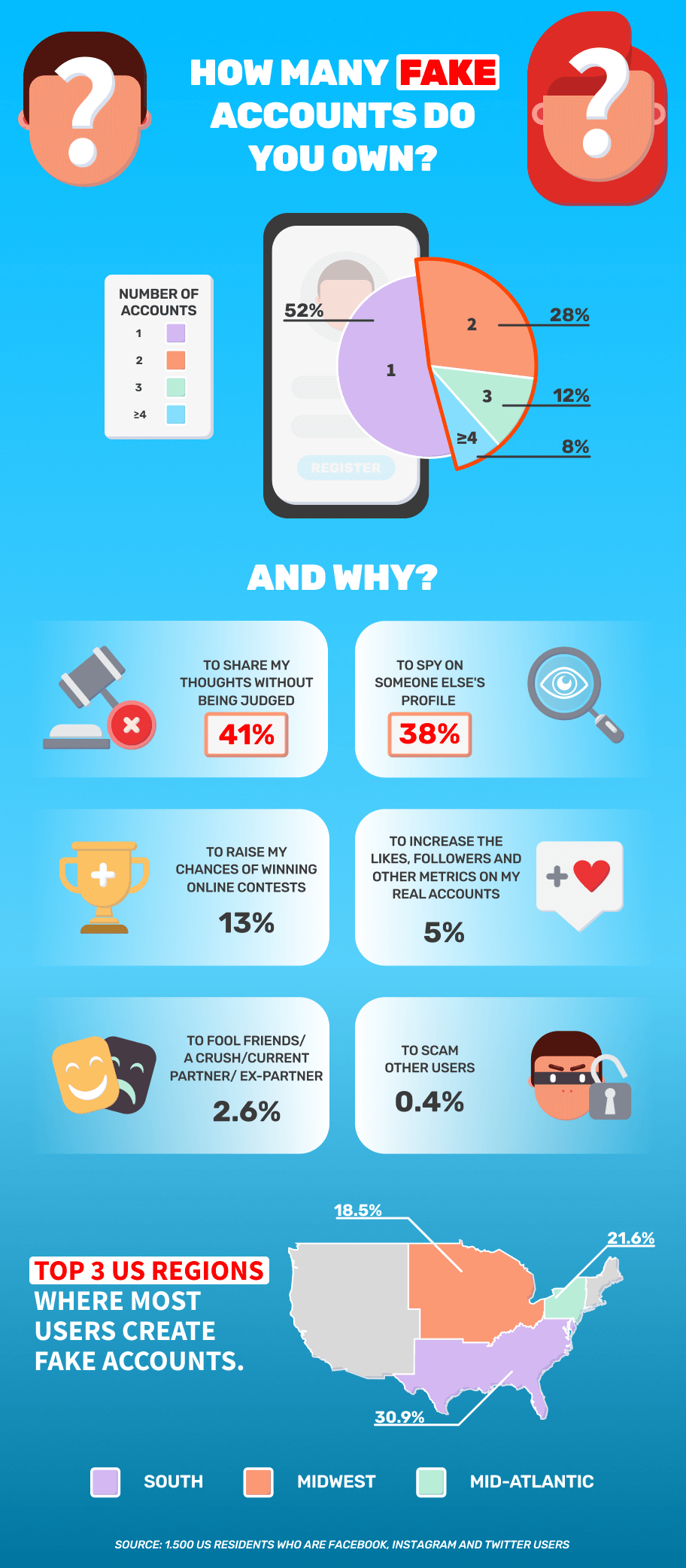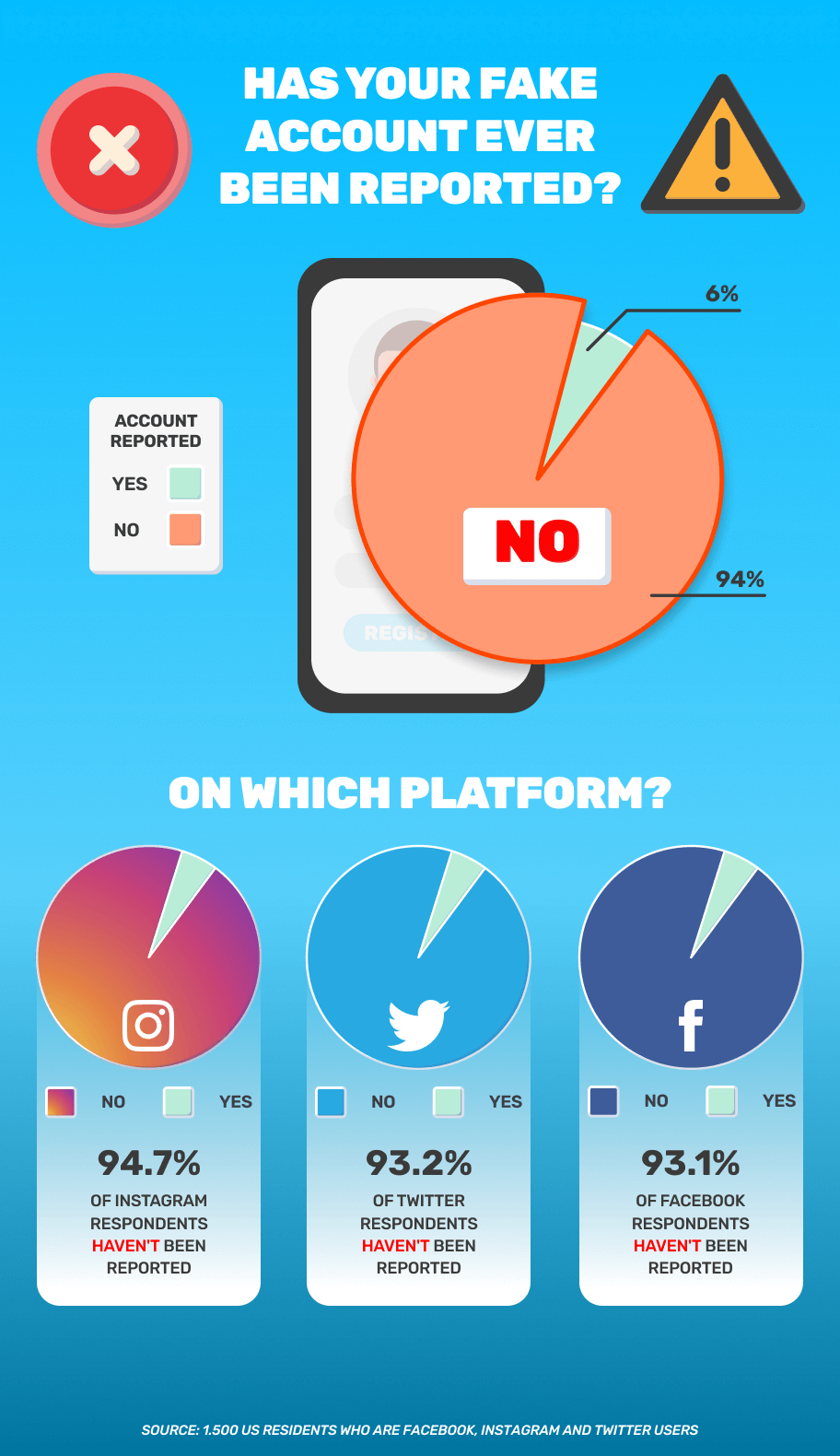Fake social media accounts are usually associated with bot networks, but some research released Tuesday revealed many social media users are creating their own fake accounts for a variety of reasons.
One in three U.S. social media users has multiple accounts on the social media platforms that they use, according to a survey of 1,500 U.S. social media users conducted by USCasinos.com. Of those with multiple accounts, nearly half (48%) have two or more additional accounts.
Reasons behind creating the additional accounts vary, but the most cited are “to share my thoughts without being judged” (41%) and “to spy on someone else’s profile” (38%).
Other motives behind creating the fake accounts include “to raise my chances of winning online contests” (13%), “to increase the likes, followers and other metrics on my real account” (5%), to fool others (2.6%) and to scam others (0.4%).
When asked where they were creating their fake accounts, respondents most often named Twitter (41%), followed by Facebook (31%) and Instagram (28%). “That’s because Twitter is much more open by default,” said Will Duffield, a policy analyst with the Cato Institute, a Washington, D.C. think tank.
“Twitter power users will often have multiple accounts — one for mass audiences, others for smaller groups, one that’s default open, one that’s private,” he told TechNewsWorld.

Infographic Credit: USCasinos.com
Twitter inspired the research by the online casino directory site, noted the study’s co-author Ines Ferreira. “We started this study mainly because of the buzz about the Elon Musk and the Twitter deal,” she told TechNewsWorld.
That deal is currently tied up in the courts and hinges on a dispute between Musk and the Twitter board over the number of fake accounts on the platform.
Sex Changing Spies
The kinds of fake accounts in the study, however, are different from those that are flustering Musk. “The survey conflates two quite different issues,” Duffield maintained.
“On one hand, you have automated accounts — things run by machines and often used for spamming. That’s the kind of fake account that Elon Musk alleges Twitter has too many of,” he told TechNewsWorld. “Then there are pseudonymous accounts, which is what’s being surveyed here. They’re operated by users who don’t want to use their real name.”
The survey also found that when creating fake accounts, most users maintained their same sex (80.9%). The main exception to that practice, the survey noted, is when users want to spy on other accounts. Then they favor creating a fake account of the opposite sex. In general, about one in 10 of the survey participants (13.1%) said they used the opposite sex when creating fake accounts.

Infographic Credit: USCasinos.com
“There are lots of reasons why we don’t want everything we do online to be attached to our real name,” Duffield observed. “And it isn’t necessarily a result of Cancel Culture or something like that.”
“One of the great things about the internet is that it allows us to compartmentalize identities or try on new personas without committing ourselves to them so we can showcase one aspect of ourselves at a time,” he explained.
“It’s quite normal for people to use pseudonyms online. If anything, using real names is a more contemporary expectation,” he said.
Accounts Created With Impunity
The study also found that a majority of fake account creators (53.3%) like to keep the practice secret from their inner circle of acquaintances. When they do mention their fake accounts, they’re most likely to mention them to friends (29.9%), followed by family (9.9%) and partners (7.7%).
The researchers also discovered that more than half the owners of fake accounts (53.3%) were millennials, while Gen X’s average three fake accounts and Gen Z’s average two.
Creators of fake accounts appear to do so with impunity, according to the study. When asked if their fake accounts had ever been reported to the platforms they were created on, 94% of the participants responded in the negative.

Infographic Credit: USCasinos.com
“Every so often these platforms release new algorithms to report these accounts, but most of them never get reported,” Ferreira said. “There are so many fake accounts, and you can create them so easily, it’s really hard to identify all of them.”
“After the Elon Musk deal with Twitter, these platforms are going to think a little bit more how they’re going to do it,” she added.
However, Duffield downplayed the need to police fake accounts by users. “Creating these accounts isn’t against the platform rules so there’s no reason for the platforms to treat them as a problem,” he said.
“Because these accounts are operated by real people, even though they don’t have real names, they act like real people,” he continued. “They’re messaging one person at a time. They’re taking time to type things out. They have a normal day/night cycle. They aren’t firing off a thousand messages all at once to a 100 different people at all hours of the day.”
Harmless Fakes?
Unlike fake accounts created by bots, fake accounts created by users are less harmful to the platforms hosting them, Duffield asserted.
“There’s a theory that people misbehave more often when they’re using a pseudonymous account or one not linked to their real identity, but from a moderation perspective, banning a pseudonymous account is no different than banning a real person,” he observed.
“Facebook has had a real name policy, although they’ve gotten a lot of flak for it over the years,” he added. “I would say that it’s deliberately under-enforced at this point.”
“As long as the pseudonymous account is obeying the rules, it isn’t an issue for the platforms,” he maintained.
While bot accounts don’t contribute to the business model of a social media platform, fake user accounts do.
“If the pseudonymous account is being used by a real human being, they’re still seeing ads,” Duffield explained. “It isn’t like a bot clicking on things without any human involved. Regardless of the name on the account, if they’re watching and being served relevant ads, then from a platform standpoint, it’s not really trouble.”
“The activity shows up in the monthly active user stats, which is what platforms, advertisers and potential purchasers care about,” he continued. “The overall number of accounts is a useless statistic because people abandon accounts constantly.”
Still, Ferreira argued that any kind of fake account undermines the credibility of a social media platform. “At some point,” she said, “there’s going to be more fake users than real users, so they need to do something about this now.”























































